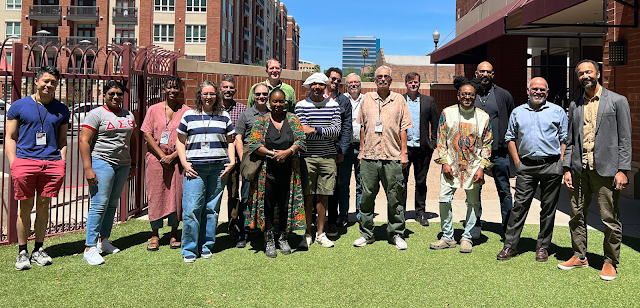by Ernest Hogan
The last time I did something with Arizona State University’s Center for Science and the Imagination was for Us in Flux, during the early part of COVID epidemic, the result was a story called “Tomorrow is Another Daze” that they published on their website. It was fun and they paid well.
So, when they asked if they asked if I wanted to participate in a workshop, that would result in another story, I said yes. The fact that they paid was a factor. When I get an email asking me to do something, I scan through looking for numbers and dollar signs.
Unlike Us in Flux which done through Zoom, Sound Systems, about the future of orchestras was live, so I did a park and ride to the ASU campus in Tempe. The local light rail is where you find black and brown Phoenix, talking, gawking, and noodling on their hand-held devices. Gliding through all the shiny, new apartment and office buildings felt futuristic.
Tempe had changed since I had last visited. The ASU campus has expanded; there is no clear division between the campus and the town. A border has been erased. New sci-fi-ish buildings tower over the old streets.
The older I get, the more the world seems sci-fi to me.
The Centerpoint building, where the CSI (what everybody calls the Center for Science and the Imagination) offices are, and retail/restaurant spaces are available, is impressive. The room where we spent most of the next day (and a half) was a great work space, and had a large window on one side, letting us see the sun, trees, grass, and people walking by on paved paths.
This really was a workshop, with an emphasis on work. We were assigned tables, each of which had a charging station at its center and a sign letting us know what our team was assigned to discuss and create a story about. Our subject was “Orchestra as Network.”
I was teamed with Paul D. Miller–better known as DJ Spooky–electronic/experimental/hip hop composer, multimedia artist, and writer; Garrett McQueen, a bassoonist, radio host, and activist who works to decolonize “classical” music; and Ashley Lauren Firth, violist, songwriter, educator, activist, and death doula. I was the only non-musician/non-composer, and person at the table not of the African diaspora.
And even though I was the only Chicano/Latinoid in the room, we were a diverse group. Jamaica, India, Nigeria, and the Asian diaspora were represented. Our four groups had a science fiction writer each, the others were either musicians, or otherwise involved with orchestras, and one worked in medicine.
Time was divided between discussions of the subject with the entire group, then breaking up into our smaller teams, to create our stories.
The discussions were wonderful. So many interesting people from different backgrounds. Ideas, information, and opinions flew. This is the sort of thing that should happen at science fiction conventions, but doesn’t anymore, in our age when the genre has become about worshiping corporate franchises.
Afrofuturism was not only discussed, but happened. Sun Ra, Octavia Butler, Samuel R. Delany were evoked. DJ Spooky and I both recommended George S. Schuyler’s Black Empire. The resulting book will not be about preserving sacred western traditions.
And it wasn’t all just work talk. We all took a walk through the streets of Tempe to experience Garth Paine’s 3D sound environments that even include audience participation through our phones. There were breaks, snacking, meals. Several participants expressed the desire for a direct brain-to-sound instrument–something that technology is coming close to creating. I got to meet Sheree Renee Thomas, editor of The Magazine of Fantasy and Science Fiction and warn her that I’d be sending her stories soon. Some of the best talk came with people relaxed, a little drunk, revealing what it’s really like to work in an orchestra.
Also, the academic discipline helped keep us on track.
The non-writers will contribute short essays based on the experience. I’m excited about the story we developed. The Sound Systems book will be exciting.
This is a great way to do a themed anthology. I’d gladly work on similar projects in the future.
Hmm. Maybe a Chicanofuturist one . . .
Ernest Hogan is preparing to dispense Papí Sci-Fi’s Ancient Chicano Sci-Fi Wisdom and write his Sound Systems story.









1 comment:
Talking with relaxed, slightly drunk orchestra musicians sounds like writer-heaven. Great post, thank you!
Post a Comment